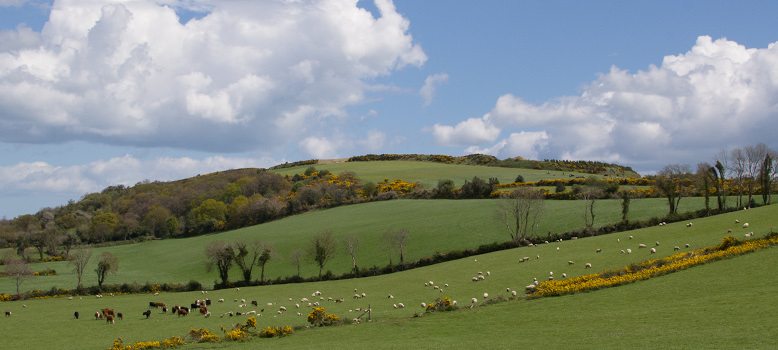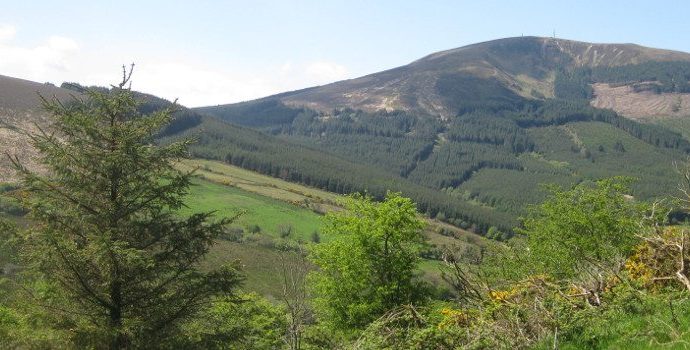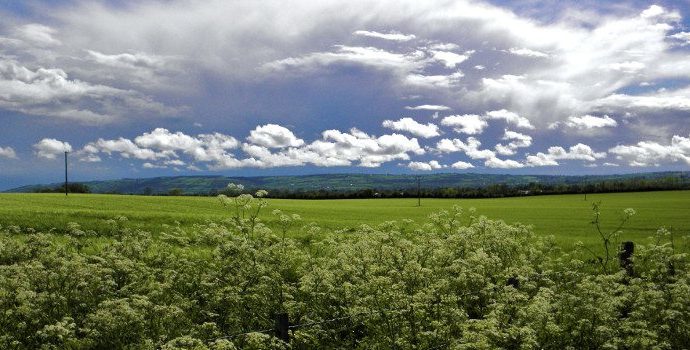Environment Council Report October 2022

- Activity since last National Council
- IFA led a campaign in advance of the announcements on the sectoral emissions ceiling for Agriculture in July. A legally binding emissions reduction target of 25% was announced for the sector. As part of the IFA campaign:
- Several lobbying and briefing documents were prepared on sectoral emission reduction targets (see enclosed).
- A national and regional lobbying campaign of Ministers, TDs, and Senators.
- Ongoing communication with Minister for Agriculture, Charlie McConalogue.
- Letter to Taoiseach Michael Martin highlighting need to set realistic target and seeking engagement with the Government.
- Several press releases issued, supported by social media posts of regional meetings with TD’s and Senator.
An online briefing webinar was held on the 3rd August to brief members of the legally emissions reduction target of 25% for agriculture. The briefing can be watched back here.
- IFA made a presentation to Joint Oireachtas Committee on Climate Action on Anaerobic Digestion (enclosed). In the statement IFA raised the following as key policy requirements which need to be addressed:
- Develop a National Biomethane Strategy so farmers have confidence to invest in AD.
- Introduce a Renewable Heat Obligation scheme (RHO) with attractive subsidies as soon as possible to support the wide scale deployment of AD production. This will give greater certainty and security of revenue for farmer led projects.
- Provide capital grant funding to support the adopted National Biomethane Strategy and meet the climate targets.
- Introduce a biomass mobilisation scheme to support farmers to coordinate, mobilise and establish a sustainable feedstock supply chain for the AD plant.
- Streamline current regulations to support the development of AD plants, particularly a small scale on-farm AD plant.
- IFA made a submission to the Citizens Assembly on Biodiversity Loss (enclosed). The following proposals were included:
- Extensive farming system
Ireland has a predominately extensive livestock grass-based farming system which uses less inputs (fertilisers, pesticide etc.) and provides many positive environmental benefits.
- Space for Nature
With space for nature now accounting for on average 12-14% of farm area. It is important that farmers’ investment and the positives changes that have been taking place on farms in recent years are fully recognised.
- High level of participation in agri-environmental schemes
33% of the farmland area in Ireland (compared with an EU average of 13%) is under agri-environmental schemes. Irish farmers have participated on a voluntary basis since 1994 enhancing farmland biodiversity. The new ACRES needs to be more attractive to encourage a level of participation similar to those in previous schemes.
- Farmers on designated land need to be properly compensated
Regulations on land use or farming practices in designated areas/protected areas that impose constraints that increase management costs or impact production must be properly compensated. To date farmers, particularly in protected areas, have not been sufficiently compensated for loss in production or land values due to designation.
- Collaborative approach to nature conservation works best
It is evident that the most successful programmes that protect and enhance farmland biodiversity and the wider ecological connectivity, have been developed in consultation with farmers. Local leadership and buy in is essential to deliver improvements locally but also increase the awareness of the threats to biodiversity in the wider farming community.
- New funding structure (outside of CAP)
The lack of financing and allocation of resources to biodiversity (outside of CAP) has been identified at EU level as a key failure in meeting biodiversity targets. New and innovative funding mechanisms, separate to CAP, must be developed to reward farmers for the wider ecosystem services provided by their actions.
- Incentive-based biodiversity policy
Incentivised management-based programmes rather than regulation, that focus on management measures tailored to local, or even farm-holding specific conditions, which are practical and not too prescriptive, can produce optimal results for biodiversity.
- Farmers need to be fully engaged on EU Nature Restoration Law
There needs to be full engagement with farmers and IFA on the proposed Nature Restoration Law. It is essential that the biodiversity targets are ambitious, but likewise that they targets are achievable, the socio-economic impacts are fully understood and that the actions are supported financially.
- Farmers property rights must be respected
All measures to enhance biodiversity must be voluntary and respected Irish farmers property rights.
- IFA made a submission to the Joint Committee on Housing, Local Government & Heritage on Issues surrounding Water Quality and Supply (enclosed). The following concerns with regards the Water Environment (Abstractions) Bill were raised in the submission:
- The limit to any claim for compensation to within 2 years of the authorised abstractions commencing.
- The requirement to notify impacted farmers will enable them to engage with the planning process and bring their views to the attention of relevant agencies.
- It is highly unusual when it comes to re-dress that that the burden of “proof of loss” would be placed on individual farmers. The draft legislation should be amended to facilitate positive discussions to bring matters to conclusion.
- The Bill should be amended to address this and provide clarity that the existing framework for compensation will continue to apply.
- Mediation is a widely used and acceptable alternative dispute resolution mechanism. It is proposed that the Bill include an obligation on all parties to firstly engage in mediation, in default of agreement.
- IFA made a submission to the Joint Committee on Agriculture, Food and the Marine on Solar Energy and the Agricultural Industry (enclosed). IFA proposed the following measures to support the deployment of solar on farms:
- Additional funding should be allocated to TAMS/On Farm Capital Investment Scheme budget, this funding should be ring-fenced, and the restrictions eased.
- Full implementation of the Microgeneration Support Scheme (MSS).
- Introduce a new small-scale solar generation scheme funded by SEAI to address the significant limitations of TAMS.
- Amend the terms of Renewable Electricity Support Scheme (RESS) to allow groups of farmers to bid in and receive support as a combined community project.
- Address the ambiguity in relation to the calculation used to determine the area of land on which solar panels are installed to ensure that the installation does not exceed the 50% of the total area of land concerned under the Finance Act.
- Introduce VAT exemption on solar equipment to support deployment of solar on farms.
- Introduce a simplified transparent process for small-scale solar project with reduced costs and a grid connection timescale.
- As part of the national roll out of Smart Metering enable farms to export excess energy produced from solar installations to the gird.
- Implement proposed revisions to the planning exemptions for the installation of solar panels on the roofs of houses and certain non-domestic buildings.
- A One Stop Shop service should be developed to simplify the pathway and support farmers considering installing solar on their farm.
- IFA made a submission to COPA on the Industrial Emissions Directive (enclosed). In the submission a number of short-medium term actions were proposed, including:
- Leading behavioural change through knowledge transfer.
- Optimising the evidence base – including an assessment and acknowledgement of mitigation techniques already in use.
- A full impact and economic assessment on what permitting would mean for the sector under scope for the revised IED.
- Targeted financial support to aid the uptake of various mitigation practices.
- EPA published a report on Water Quality in Ireland 2016 – 2021 .The report shows that over half (54%) of our surface waters are in good or better ecological status which means that nearly half (46%) are in unsatisfactory condition.
- IFA issued a press release stating that the report shows that the ongoing work through targeted measures should continue to bring about the improvements that are needed.


Graphs show ecological status of water 2016 – 2021 and a general pattern since 2007.
- IFA made presentations to several County Executives: Limerick, Dublin, Tipperary South, Laois, Roscommon, Kerry, and Louth on the work of the committee including the Sectoral Emissions Ceilings, the Nitrates Action plan and biodiversity.
- IFA spoke at a webinar on Microgeneration -The Future is Solar? organised Colm Markey, MEP.
- IFA took part in a panel discussion at the Irish Bioenergy Association National Conference organised by IrBEA.
- IFA attended the Energy in Agriculture show held in July 2022 and took part in a panel discussion on solar energy.
- IFA attended several meetings including Irish Fertiliser Association, the Water Forum, ASSAP Farmer Consultation Group, the Irish Farm Films Producers Group (IFFPG) and the Greenway Stakeholders Group.
- IFA to meet with TII on progress negotiations on the national roads agreement on the 20th October, in addition:
- IFA met with the senior management on the proposed new 80km long N/M20 Cork-Limerick Road project.
- IFA met with senior executives in Cork and Waterford County Councils along with engineers from Atkins Consultants in Fermoy to discuss plans for the proposed Mallow to Dungarvan Greenway.
- Committee members took part in several NESC and Climate KIC workshops to discuss the climate transition for farmers.
- IFA issued a press release on the Nitrates Action Programme and the lack of communication from the Department of Agriculture to farmers in relation to changes introduced.
- The Budget 2023 introduced new or additional supports for farm businesses with environmental focus these included:
- €1.25bn Temporary Business Energy Support Scheme. If the increase in average unit price (2022 vs 2021) is more than 50% then a farm would be eligible for support (40% of the increase in the bill amount).
- €218m for Agri-Environment Schemes.
- A new €8m Liming Scheme, as well as an enhanced Multi-Species Swards/Red Clover scheme.
- Funding of €13.3m to extend the Farm Environmental Scheme and the Soil Sampling Scheme.
- €3m for pilot anaerobic digestion investment.
- An increase in the TAMS budget to €90m to fund the proposed large-scale investment in on-farm renewables for farmers. This will fund the proposed increase to 60% grant rate for solar.
- A three-year scheme of accelerated capital allowances for farmers for the construction of slurry storage facilities has been introduced.
- The Smart Farming programme is currently undertaking a reflective impact assessment of the resource efficiency programme from 2017-2021. As part of the process approx. 100 farmers and farm advisors will be interviewed. The survey is underway.
- A dedicated Smart Farming hub has been developed on the IFA website to include advice, resources and updates on the programme which are published in the weekly IFA newsletter.
- Smart Farming had a stand at the Ploughing Championship to promote the programme and new guidance notes.
- New guidance notes on Feed and Agri Technology are in development and will be published in the coming weeks.
- The IFA Environment and Rural Affairs Committee met on the 8th June 2022, guest speakers included Noel Meehan, Programme Manager, Teagasc on the Agriculture Sustainability and Advisory Programme (ASSAP) and Liam Moloney, General Manager, Irish Farm Film Producers Group (IFFPG).
- Any EU/COPA developments
- IFA will attend the COPA Working Party meeting on Environment in Brussels on the 18th October This meeting will facilitate the elections of the Chairman and Vice Chairman of the working party.
- Upcoming issues
- IFA will address Citizens’ Assembly on Biodiversity on Saturday 15th October.
- IFA will present to the Joint Oireachtas Committee for Agriculture on the EU Nature Restoration Targets on Wednesday 19th October.
- IFA will meet TII Thursday 20th October regarding ongoing negotiations.
- IFA will make a submission on the National Biodiversity Action Plan before the 9th November.



